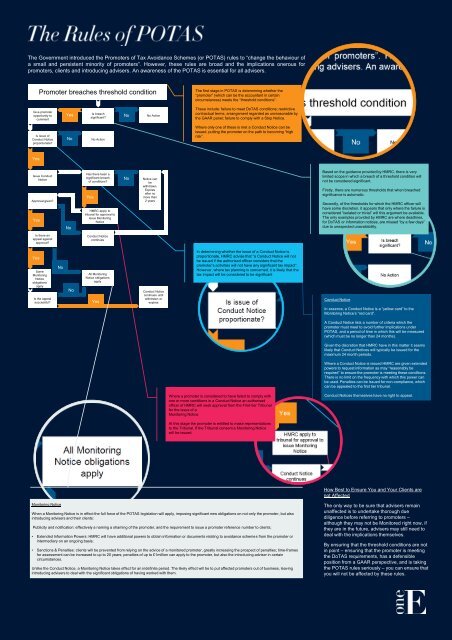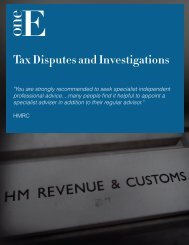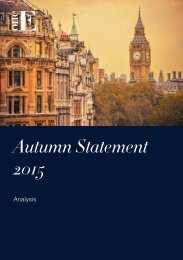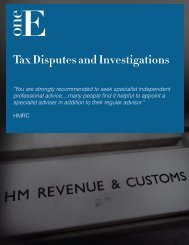You also want an ePaper? Increase the reach of your titles
YUMPU automatically turns print PDFs into web optimized ePapers that Google loves.
The Government introduced the Promoters <strong>of</strong> Tax Avoidance Schemes (or <strong>POTAS</strong>) rules to “change the behaviour <strong>of</strong><br />
a small and persistent minority <strong>of</strong> promoters”. However, these rules are broad and the implications onerous for<br />
promoters, clients and introducing advisers. An awareness <strong>of</strong> the <strong>POTAS</strong> is essential for all advisers.<br />
Promoter breaches threshold condition<br />
The first stage in <strong>POTAS</strong> is determining whether the<br />
“promoter” (which can be the accountant in certain<br />
circumstances) meets the “threshold conditions”.<br />
Give promoter<br />
opportunity to<br />
comment<br />
Yes<br />
Is breach<br />
significant?<br />
No<br />
No Action<br />
These include: failure to meet DoTAS conditions; restrictive<br />
contractual terms; arrangement regarded as unreasonable by<br />
the GAAR panel; failure to comply with a Stop Notice.<br />
Is issue <strong>of</strong><br />
Conduct Notice<br />
proportionate?<br />
No<br />
No Action<br />
Where only one <strong>of</strong> these is met a Conduct Notice can be<br />
issued, putting the promoter on the path to becoming “high<br />
risk”.<br />
Yes<br />
Issue Conduct<br />
Notice<br />
Approval given?<br />
Yes<br />
No<br />
Has there been a<br />
significant breach<br />
<strong>of</strong> conditions?<br />
Yes<br />
HMRC apply to<br />
tribunal for approval to<br />
issue Monitoring<br />
Notice<br />
No<br />
Notice can<br />
be<br />
withdrawn.<br />
Expires<br />
after no<br />
more than<br />
2 years<br />
Based on the guidance provided by HMRC, there is very<br />
limited scope in which a breach <strong>of</strong> a threshold condition will<br />
not be considered significant.<br />
Firstly, there are numerous thresholds that when breached<br />
significance is automatic.<br />
Secondly, <strong>of</strong> the thresholds for which the HMRC <strong>of</strong>ficer will<br />
have some discretion, it appears that only where the failure is<br />
considered “isolated or trivial” will this argument be available.<br />
The only examples provided by HMRC are where deadlines,<br />
for DoTAS or information notices, are missed “by a few days”<br />
due to unexpected unavailability.<br />
Is there an<br />
appeal against<br />
approval?<br />
Conduct Notice<br />
continues<br />
Yes<br />
Some<br />
Monitoring<br />
Notice<br />
obligations<br />
apply<br />
Is the appeal<br />
successful?<br />
No<br />
No<br />
All Monitoring<br />
Notice obligations<br />
apply<br />
Yes<br />
Conduct Notice<br />
continues until<br />
withdrawn or<br />
expires<br />
In determining whether the issue <strong>of</strong> a Conduct Notice is<br />
proportionate, HMRC advise that “a Conduct Notice will not<br />
be issued if the authorised <strong>of</strong>ficer considers that the<br />
promoterʼs activities will not have any significant tax impact”.<br />
However, where tax planning is concerned, it is likely that the<br />
tax impact will be considered to be significant<br />
Conduct Notice<br />
In essence, a Conduct Notice is a “yellow card” to the<br />
Monitoring Notice’s “red card”.<br />
A Conduct Notice lists a number <strong>of</strong> criteria which the<br />
promoter must meet to avoid further implications under<br />
<strong>POTAS</strong>, and a period <strong>of</strong> time in which this will be measured<br />
(which must be no longer than 24 months).<br />
Given the discretion that HMRC have in this matter it seems<br />
likely that Conduct Notices will typically be issued for the<br />
maximum 24 month periods.<br />
Where a Conduct Notice is issued HMRC are given extended<br />
powers to request information as may “reasonably be<br />
required” to ensure the promoter is meeting these conditions.<br />
There is no limit on the frequency with which this power can<br />
be used. Penalties can be issued for non-compliance, which<br />
can be appealed to the first tier tribunal.<br />
Where a promoter is considered to have failed to comply with<br />
one or more conditions in a Conduct Notice an authorised<br />
<strong>of</strong>ficer <strong>of</strong> HMRC will seek approval from the First-tier Tribunal<br />
for the issue <strong>of</strong> a<br />
Monitoring Notice.<br />
Conduct Notices themselves have no right to appeal.<br />
At this stage the promoter is entitled to make representations<br />
to the Tribunal. If the Tribunal consent a Monitoring Notice<br />
will be issued.<br />
How Best to Ensure You and Your Clients are<br />
not Affected<br />
Monitoring Notice<br />
When a Monitoring Notice is in effect the full force <strong>of</strong> the <strong>POTAS</strong> legislation will apply, imposing significant new obligations on not only the promoter, but also<br />
introducing advisers and their clients:<br />
Publicity and notification: effectively a naming a shaming <strong>of</strong> the promoter, and the requirement to issue a promoter reference number to clients;<br />
• Extended Information Powers: HMRC will have additional powers to obtain information or documents relating to avoidance schemes from the promoter or<br />
intermediary on an ongoing basis;<br />
• Sanctions & Penalties: clients will be prevented from relying on the advice <strong>of</strong> a monitored promoter, greatly increasing the prospect <strong>of</strong> penalties; time-frames<br />
for assessment can be increased to up to 20 years; penalties <strong>of</strong> up to £1million can apply to the promoter, but also the introducing adviser in certain<br />
circumstances.<br />
Unlike the Conduct Notice, a Monitoring Notice takes effect for an indefinite period. The likely effect will be to put affected promoters out <strong>of</strong> business, leaving<br />
introducing advisers to deal with the significant obligations <strong>of</strong> having worked with them.<br />
The only way to be sure that advisers remain<br />
unaffected is to undertake thorough due<br />
diligence before referring to promoters –<br />
although they may not be Monitored right now, if<br />
they are in the future, advisers may still need to<br />
deal with the implications themselves.<br />
By ensuring that the threshold conditions are not<br />
in point – ensuring that the promoter is meeting<br />
the DoTAS requirements, has a defensible<br />
position from a GAAR perspective, and is taking<br />
the <strong>POTAS</strong> rules seriously – you can ensure that<br />
you will not be affected by these rules.












